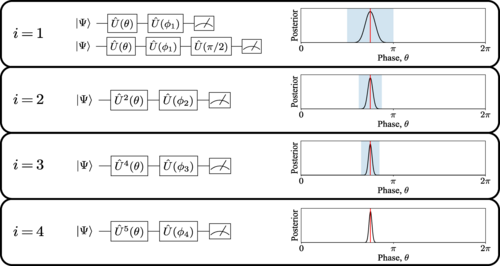The Adaptive Bayesian Quantum Algorithm for Phase Estimation, developed by researchers from the University of Cambridge and the Hitachi Cambridge Laboratory, is a significant advancement in quantum computing. Published in the Physical Review A journal, the algorithm optimises the estimation of the unknown strength of a unitary evolution, a crucial subroutine in quantum computing applications. Unlike the original quantum phase estimation algorithm, which requires large-scale entangled probes and fault-tolerant quantum computing, this new algorithm uses coherence and statistical inference to produce quantum-boosted phase estimates without interprobe entanglement. The algorithm’s adaptive nature allows it to achieve optimal quadratic scaling in the mean absolute error and the mean squared error.
What is the Adaptive Bayesian Quantum Algorithm for Phase Estimation?
The Adaptive Bayesian Quantum Algorithm for Phase Estimation is a new development in the field of quantum computing. This algorithm was developed by Joseph G Smith, Crispin H W Barnes, and David R M Arvidsson-Shukur from the Cavendish Laboratory Department of Physics at the University of Cambridge and the Hitachi Cambridge Laboratory. The algorithm was published in the Physical Review A journal in April 2024.
Quantum phase estimation algorithms are crucial subroutines in many applications for quantum computers and in quantum metrology protocols. These algorithms estimate the unknown strength of a unitary evolution. The original algorithm for quantum phase estimation cannot be implemented on near-term hardware as it requires large-scale entangled probes and fault-tolerant quantum computing. Therefore, alternative algorithms have been introduced that rely on coherence and statistical inference. These algorithms produce quantum-boosted phase estimates without interprobe entanglement.
The Adaptive Bayesian Quantum Algorithm for Phase Estimation is a coherence-based phase-estimation algorithm which can achieve the optimal quadratic scaling in the mean absolute error and the mean squared error. In the presence of noise, this algorithm produces errors that approach the theoretical lower bound. The optimality of this algorithm stems from its adaptive nature. Each step is determined iteratively using a Bayesian protocol that analyzes the results of previous steps.
How Does Quantum Phase Estimation Work?
Quantum phase estimation is used as a subroutine of many quantum algorithms, a component in gravitational-wave detection, a method to measure time, and as a tool to compute ground state energies. Phase estimation is the estimation of an unknown phase that a unitary operation applies to a quantum state. Traditional techniques evolve separable probes via the unitary operation and can lead to an estimate with variance bounded by the standard quantum limit. If multiple probes are entangled instead, estimates can be made with variance bounded by the Heisenberg limit.
However, the most trivial applications of entangled states in phase estimation yield ambiguous estimates due to the multivalued nature of the inverse functions used. Precise unambiguous estimates of the phase require the use of a phase-estimation algorithm. Such algorithms achieve what is known as point identification of the phase’s estimate.
What is the Quantum Phase Estimation Algorithm (QPEA)?
The Quantum Phase Estimation Algorithm (QPEA) is the best-known example of a phase-estimation algorithm. The QPEA requires large-scale fully entangled states, the application of several controlled versions of the unitary operation, and the ability to implement the inverse Fourier-transform algorithm. Although the QPEA attains some Heisenberg scaling errors and point identification, its requirements put stringent limits on which systems or platforms it can be successfully implemented on. This stringency has led to the development of less cumbersome phase-estimation algorithms based on statistical inference.
What are Inference-Based Algorithms?
Inference-based algorithms achieve a quantum enhancement by constructing distributions of possible candidate values for the estimate of the phase by iteratively sampling multiple circuits. These circuits can either be selected before the algorithm commences or adaptively as the algorithm runs. The circuits constitute several applications of the unitary operation but do not necessitate interprobe entanglement, loosening the requirements for physical implementation. A shortcoming of the inference-led phase-estimation algorithms is that few have considered the effect of noise present in realistic devices.
How Does the Adaptive Bayesian Phase Estimation Algorithm Work?
The Adaptive Bayesian Phase Estimation Algorithm obtains in the limit of large total number of times the unitary operation is applied, the Heisenberg scaling of two errors: the mean absolute error and the mean squared error when noise is absent, and a theoretical lower bound on errors when noise is present. The algorithm attains this performance through adaptive iteration, executing a series of circuits with parameters depending on the results of previous measurements. These circuits require one probe at a time and hence no interprobe entanglement. Numerical simulations demonstrate that the Bayesian algorithm outperforms other phase-estimation algorithms in these error metrics.
Publication details: “Adaptive Bayesian quantum algorithm for phase estimation”
Publication Date: 2024-04-11
Authors: Joseph G. Smith, C. H. W. Barnes and David R. M. Arvidsson-Shukur
Source: Physical review. A/Physical review, A
DOI: https://doi.org/10.1103/physreva.109.042412

